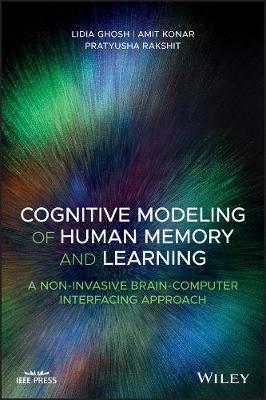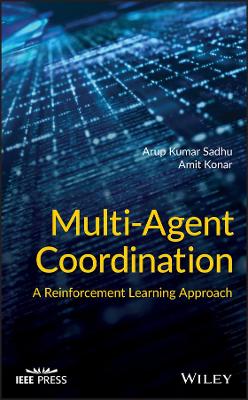Wiley - IEEE
2 total works
Cognitive Modeling of Human Memory and Learning
by Lidia Ghosh, Amit Konar, and Pratyusha Rakshit
Proposes computational models of human memory and learning using a brain-computer interfacing (BCI) approach
Human memory modeling is important from two perspectives. First, the precise fitting of the model to an individual's short-term or working memory may help in predicting memory performance of the subject in future. Second, memory models provide a biological insight to the encoding and recall mechanisms undertaken by the neurons present in active brain lobes, participating in the memorization process. This book models human memory from a cognitive standpoint by utilizing brain activations acquired from the cortex by electroencephalographic (EEG) and functional near-infrared-spectroscopic (f-NIRs) means.
Cognitive Modeling of Human Memory and Learning A Non-invasive Brain-Computer Interfacing Approach begins with an overview of the early models of memory. The authors then propose a simplistic model of Working Memory (WM) built with fuzzy Hebbian learning. A second perspective of memory models is concerned with Short-Term Memory (STM)-modeling in the context of 2-dimensional object-shape reconstruction from visually examined memorized instances. A third model assesses the subjective motor learning skill in driving from erroneous motor actions. Other models introduce a novel strategy of designing a two-layered deep Long Short-Term Memory (LSTM) classifier network and also deal with cognitive load assessment in motor learning tasks associated with driving. The book ends with concluding remarks based on principles and experimental results acquired in previous chapters.
- Examines the scope of computational models of memory and learning with special emphasis on classification of memory tasks by deep learning-based models
- Proposes two algorithms of type-2 fuzzy reasoning: Interval Type-2 fuzzy reasoning (IT2FR) and General Type-2 Fuzzy Sets (GT2FS)
- Considers three classes of cognitive loads in the motor learning tasks for driving learners
Cognitive Modeling of Human Memory and Learning A Non-invasive Brain-Computer Interfacing Approach will appeal to researchers in cognitive neuro-science and human/brain-computer interfaces. It is also beneficial to graduate students of computer science/electrical/electronic engineering.
Discover the latest developments in multi-robot coordination techniques with this insightful and original resource
Multi-Agent Coordination: A Reinforcement Learning Approach delivers a comprehensive, insightful, and unique treatment of the development of multi-robot coordination algorithms with minimal computational burden and reduced storage requirements when compared to traditional algorithms. The accomplished academics, engineers, and authors provide readers with both a high-level introduction to, and overview of, multi-robot coordination, and in-depth analyses of learning-based planning algorithms.
You'll learn about how to accelerate the exploration of the team-goal and alternative approaches to speeding up the convergence of TMAQL by identifying the preferred joint action for the team. The authors also propose novel approaches to consensus Q-learning that address the equilibrium selection problem and a new way of evaluating the threshold value for uniting empires without imposing any significant computation overhead. Finally, the book concludes with an examination of the likely direction of future research in this rapidly developing field.
Readers will discover cutting-edge techniques for multi-agent coordination, including:
- An introduction to multi-agent coordination by reinforcement learning and evolutionary algorithms, including topics like the Nash equilibrium and correlated equilibrium
- Improving convergence speed of multi-agent Q-learning for cooperative task planning
- Consensus Q-learning for multi-agent cooperative planning
- The efficient computing of correlated equilibrium for cooperative q-learning based multi-agent planning
- A modified imperialist competitive algorithm for multi-agent stick-carrying applications
Perfect for academics, engineers, and professionals who regularly work with multi-agent learning algorithms, Multi-Agent Coordination: A Reinforcement Learning Approach also belongs on the bookshelves of anyone with an advanced interest in machine learning and artificial intelligence as it applies to the field of cooperative or competitive robotics.

